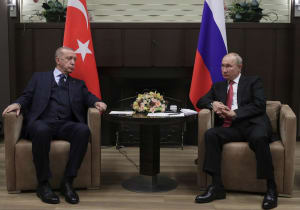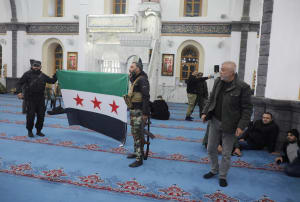Syria’s new patron? Turkey offers to train new military, claims it ‘paved the way’ for Assad’s bloodless toppling
Turkey & US discuss contradicting interests in Syria’s northeast Kurdish regions

Since the fall of Syria’s Assad regime, Turkey has spearheaded efforts to establish relations with the new government, led by forces of the Islamist Hay’at Tahrir al-Sham (HTS) group.
After Turkey reopened its embassy in Damascus on Saturday, one of the first to do so after the rebel groups entered the city a week ago, Turkey's Defense Minister Yaşar Güler said on Sunday that his country would offer to train the new security forces of Syria “if requested to do so.”
However, Güler added Turkey would discuss its own military presence in Syria only “when the necessary conditions are created.”
Turkey established working relations with HTS years ago, after the group took over the governance of the rebel enclave around the city of Idlib, close to the Turkish border.
The Turkish Armed Forces have thousands of soldiers stationed in the northeastern part of the country, including border areas it captured years ago from the Syrian Kurdish militia, known as the Syrian Democratic Forces (SDF).
Ankara’s relations with HTS are not as close as those with the Syrian National Army (SNA), an alliance that includes hardcore jihadi fighters, is currently fighting the SDF, and is reportedly operating directly under Turkey’s influence.
However, Turkey allowed HTS – designated as a terror group by Turkey, the U.S., and the UN – to build a solid economy in Idlib while shielding it from direct assaults from the regime forces. It also possibly knew about the plans for the operation to capture Aleppo, which eventually led to the regime’s total collapse.
Güler stressed that the new Syrian government has so far said the right things about how it intends to govern.
“In their first statement, they announced that they would respect all government institutions, the UN and other international organizations. We think we need to see what the new administration will do and give them a chance.”
Turkey's Foreign Minister Hakan Fidan agreed with Güler, telling local channel NTV on Friday, “What they say and what they do coincide. They are on the right track.”
In recent days, Turkey has repeatedly signaled that it intends to recognize and support Syria’s new government, quickly establishing facts on the ground to entrench itself as the country’s most important ally, following the withdrawal of most Russian and Iranian forces that had supported the Assad regime.
Turkey's Intelligence Chief Ibrahim Kalin was the first foreign official to travel to Damascus since the new government seized control, meeting with HTS leader Ahmad al-Shara (al-Jolani), and praying in the capital’s Ummayad Mosque in a highly symbolic act.
On Friday, Fidan reiterated that his country had played a central part in the fall of the regime.
“We paved the way for this to be bloodless by continuing focused talks,” he said.
“The most vital issue that needed to be done was for the Russians not to enter the equation,” Fidan continued. “The Iranian Foreign Minister came, and we got together with the Russians and Iranians in Doha and talked about certain issues.”
“If the regime had been supported, it could have been very bloody. The Russians and Iranians saw that there was no point in continuing this; after a certain point, they called, and Assad left that evening.”
In the same interview, Fidan asserted that the Kurdish YPG militia, which is part of the SDF, remained a “strategic target.”
Fidan’s comments came shortly after he met with U.S. State Secretary Antony Blinken and appeared to contradict the spirit of the discussion, which focused on finding common ground to smooth over the transition of power in Syria.
While the Turkish-backed SNA continues to fight the SDF, U.S. forces support the Kurdish militia and are stationed in areas held by it.
The U.S.-SDF alliance once began as part of the international coalition to defeat ISIS in Syria and Iraq, which also included Turkey.
“Our countries worked very hard and gave a lot over many years to ensure the elimination of the territorial caliphate of ISIS, to ensure that threat doesn't rear its head again, and it's imperative that we keep at those efforts,” Blinken said while visiting Ankara.
Turkey argues that the SDF is led by the Kurdish YPG militia, which Ankara sees as an ally of the Kurdistan Workers Party (PKK), a terror group it has been fighting for decades.
An informed U.S. official told Reuters that Fidan and Blinken discussed an agreement that allowed SDF to withdraw safely from the city of Manbij, which was taken over by the Turkish-backed SNA. They reportedly agreed on the importance of maintaining the SDF’s control over large prison camps holding former ISIS fighters and their families.
Turkey's “priority in Syria is to ensure stability...as soon as possible, to prevent terrorism from gaining ground and to prevent Islamic State and the PKK from dominating there,” Fidan said.
On Sunday, Güler repeated Fidan’s statement that the destruction of the YPG, a central component of the SDF, remained a top priority.
“The terrorist organizations PKK and YPG in Syria will be annihilated sooner or later,” he said. “The members of these organizations who came from outside Syria will have to leave it. The Syrians among them will have to lay down their weapons.”
He also contradicted American warnings of a looming resurgence of ISIS, stating, “Has anyone heard of any ISIS attack in Syria in the last three years? We don't see or hear anything about ISIS right now.”

The All Israel News Staff is a team of journalists in Israel.
You might also like to read this:















